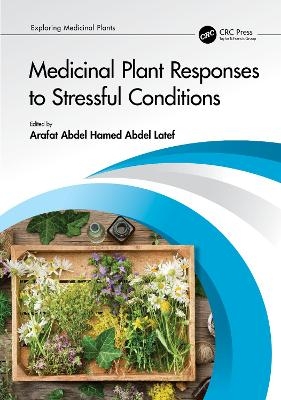
Medicinal Plant Responses to Stressful Conditions
CRC Press (Verlag)
978-1-032-15196-0 (ISBN)
Medicinal Plant Responses to Stressful Conditions discusses the effects of multiple biotic and abiotic stressors on medicinal plants. It features information on biochemical, molecular and physiological strategies used to mitigate or alleviate detrimental effects of biotic and abiotic stressors. The book contains chapters featuring medicinal plants of importance covering subjects including genomics, functional genomics, metabolomics, phenomics, proteomics and transcriptomics under biotic and abiotic stress of medicinal plants and their molecular responses. It suggests exogenous application of different types of stimulants to enhance medicinal plant production in such conditions.
Features:
Details all aspects of biotic and abiotic stressors in various important medicinal plant species.
Chapters cover evidence-based approaches in the diagnosis and management of medicinal plants under stressful conditions.
Includes information on ways to mitigate effects from biotic stress (diseases and pests) or abiotic stress (high salinity, drought, temperature extremes, waterlogging, wind, high light intensity, UV radiation, heavy metals and mineral deficiencies).
A volume in the Exploring Medicinal Plants series, this book is an essential resource for plant scientists, botanists, environmental scientists and anyone with an interest in herbal medicine.
Professor Arafat Abdel Hamed Abdel Latef is a professor of plant physiology at the Department of Botany and Microbiology, Faculty of Science, South Valley University, Egypt. He received his BSc in 1998, M.Sc. in 2003 and Ph.D. in 2005 from South Valley University, Egypt. Prof. Arafat has published more than 80 research/review articles in high-quality international and local journals. He has edited one book for CRC Press, Taylor & Francis Group, LLC (published in July 2021) and one book for Springer-Verlag, Heidelberg (published in November 2022). He has also published 20 book chapters in international volumes including John Wiley and Sons Inc, Taylor & Francis Group, Academic Press (Elsevier) and Springer-Verlag, Heidelberg. Prof. Arafat is the recipient of the ParOwn 1207 Post Doctor Fellowship 2007 granted by the Egyptian Ministry of Higher Education and Scientific Research, which was carried out in the Institute of Vegetables and Flowers, Chinese Academy of Agricultural Sciences, Beijing, China. He is serving as an editorial member for 15 reputed journals and a guest editor for four special issues in Plants—Basel (2), Frontiers in Plant Science (1) and Phyton-International Journal of Experimental Botany (1). Furthermore, he is an expert reviewer for 120 international journals. Recently, he received the Top Peer Reviewer Award 2019 Powered by Publons. Prof. Arafat has received several awards such as the Egypt State Award for Excellence 2021, South Valley University Award for Excellence 2019 and South Valley University Award for Scientific Publication (2010–2022). Prof. Arafat is actively engaged in studying the physio-biochemical and molecular responses of different plants under environmental stresses and their tolerance strategies under these stressors.
Contents
1. Allium cepa under stressful conditions
2. Allium sativum and Stressful Conditions
3. Anethum graveolens and Stressful Conditions
4. Avena sativa under Drought Stress
5. Avena sativa under Toxic Elements
6. Citrus lemon and Stressful Conditions
7. Crocus sativus and Stressful Conditions
8. Cuminum cyminum and Stressful Conditions
9. Medicinal plant Hibiscus sabdariffa L. and its responses to various stresses
10. Mentha piperita and Stressful Conditions
11. Moringa oleifera under Stressful Conditions
12. Nigella sativa and Stressful Conditions
13. Olea europaea and Stressful Conditions
14. Origanum taxa and stressful conditions
15. Petrosolinum crispum under Stressful Conditions
16. Pheonix dectylifera and Stressful Conditions
17. Portulaca oleracea under Salt Stress
18. Portulaca oleracea under Drought Stress
19. Ricinus communis and Stressful Conditions
20. Salvadora persica L. and Stressful Conditions
21. Salvia officinalis and Stressful Conditions
22. The role of secondary metabolites in Thymus vulgaris under abiotic stress
23. Trigonella foenum-graceum and stressful conditions
| Erscheinungsdatum | 29.04.2023 |
|---|---|
| Reihe/Serie | Exploring Medicinal Plants |
| Zusatzinfo | 11 Line drawings, black and white; 28 Halftones, black and white; 39 Illustrations, black and white |
| Verlagsort | London |
| Sprache | englisch |
| Maße | 178 x 254 mm |
| Gewicht | 1050 g |
| Themenwelt | Naturwissenschaften ► Biologie |
| Technik ► Umwelttechnik / Biotechnologie | |
| Weitere Fachgebiete ► Land- / Forstwirtschaft / Fischerei | |
| ISBN-10 | 1-032-15196-X / 103215196X |
| ISBN-13 | 978-1-032-15196-0 / 9781032151960 |
| Zustand | Neuware |
| Haben Sie eine Frage zum Produkt? |
aus dem Bereich


